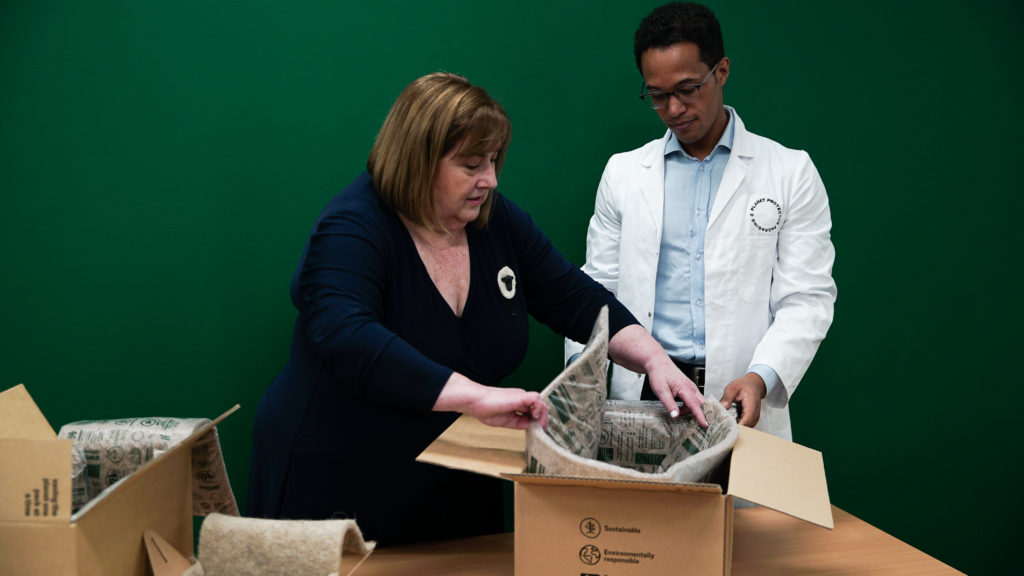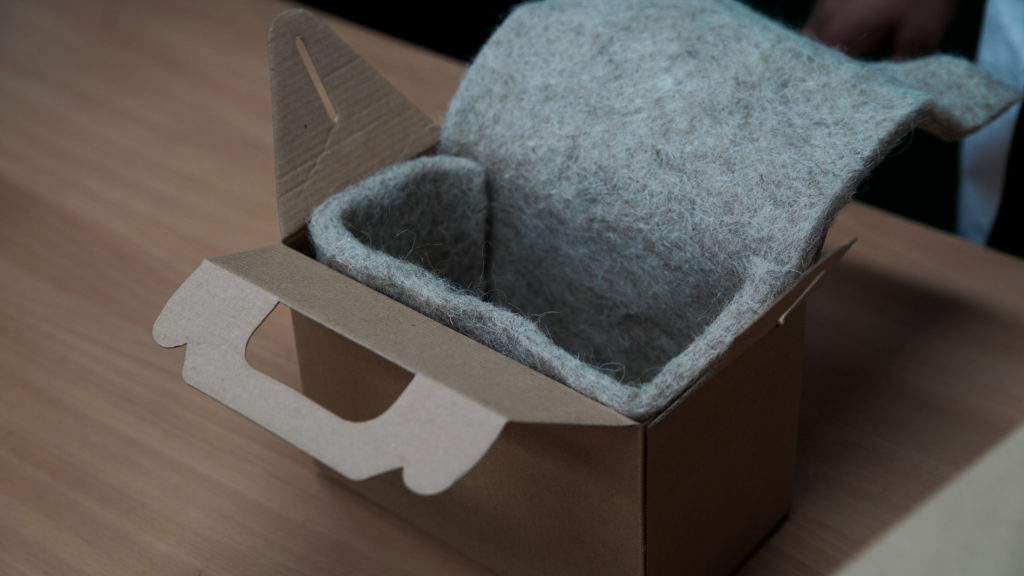Joanne Howarth, like many global citizens, is quite anxious about the specter of climate change and the modern industrial processes that cannot sustain a robust ecosystem for Earth’s biodiversity. An overreliance on synthetic materials, specifically polystyrene, in the food packing industry, horrified Howarth, while also galvanizing her to manufacture a renewable solution with a critical potential to revolutionize a problematic standard.
Years of intense focus, trial and error, as well as an unwavering ecological determination, lead Howarth to create a Woolpack, which utilizes natural fibres to safely store food items while also regulating temperatures. Howarth’s endeavours have not gone unnoticed, as she was recently crowned a laureate winner for Cartier’s 2020 Women’s Initiative, which recognizes innovative excellence in social and environmental causes and offers support to emergent female entrepreneurs. S/ recently spoke with Howarth about how her revolutionary proposition can change an industry in desperate need of an overhaul, the personal impetus inspiring her woollen creation, and how this fellowship can help propel her company to new heights.
Become an S Insider
The latest in fashion, beauty, design, and arts & culture.
What first made you aware of the toxicity of polystyrene?
“My story is really one of someone who went from a waste offender to a sustainability crusader after seeing the devastating impact polystyrene was having through my own business. I was contracted as the outsource partner for Australia’s largest meal kit company. We were dispatching tens of thousands of polystyrene boxes to households all around the country week after week.
“As a subscription-based service, after 6 weeks, consumers had 6 polystyrene boxes and no way to dispose of them. It did not take long for people to vocalise their disdain on social media platforms. I was abused many times, and I was unable to stand up and defend my client’s position. Once I did the research and discovered how truly incideous this material is in our environment, I could not remain silent; it went against everything I believe and it was this that compelled me to research a more sustainable alternative.”

How did you discover the efficacy of wool as an alternative?
“I spent close to two years researching and scouring the globe for a sustainable alternative to polystyrene. I stumbled across an innovation made some ten years earlier and it was through this, I discovered the thermal properties of wool for insulative packaging. I like to say that Woolpack borrows from nature. It is nature’s smart fibre; just as the wool keeps the sheep warm in winter, so too, it keeps them cool in summer.
“The biggest challenge was to formulate a product that could suit Australian summers as well as New Zealand winters. Two years of testing went into finding the right blends of wool, discovering the proper formulation and finalizing the design in consultation with many industry partners.”
Was there a personal desire embedded in your innovation to modernize the packaging industry’s transgressions?
“When doing my research I was horrified to discover a humungous 42% of the world’s plastic pollution emanates from the packaging industry. I honestly do not think I could have continued in the food service industry if the only option I had was to release tonnes of harmful materials every week into society with no way to recover them. For me, this journey was enabling me to continue to operate my business in good faith. Who would have known that five years later, sustainable packaging would turn into my life’s work? I wouldn’t have it any other way!”
What are the properties of non-textile grade wool that makes it perfect for packaging?
“Australia became wealthy off the wool on the sheep’s back, and indeed we have the best quality textile wool in the world. But for insulation, we need the ugly stuff! It is the coarse wool that acts as a natural insulator by wicking away moisture and creating a thermal barrier. This type of wool can also be found in cross-bred sheep which are not commonly commodified for their wool.
“This type of waste wool historically has been either sold for pennies or discarded altogether. By securing its supply we are saving a waste stream from landfill, providing increased income to sheep farmers and wool processors and giving new life to a sustainable material.”

It must be very trying to conceive of an alternative to an industry-standard product, especially with how widespread polystyrene is. How are you reaching out to businesses and revealing the more sustainable benefits of wool?
“If businesses are to transition away from polystyrene which has been the ‘go-to’ industry benchmark for 60 years, they need confidence in the thermal performance and safety of our product. We are constantly conducting in-house testing as well as advising companies how to validate its performance in their own supply chains. We find that putting our packaging against polystyrene in live trials is the best way to prove to a prospective client its thermal credentials. The proof is in the results, and I can confidently say Woolpack is consistently the product that offers the best performance.
“Being a start-up company, we’ve spent many years ‘on the ground’ at conferences, research centres, and with prospective clients. We have won 4 categories in the preeminent WorldStar Packaging Awards, our brand is growing, we are constantly gaining public visibility. This has opened up opportunities with larger companies and organizations and we can now count some iconic global brands the likes of DHL and Blackmores amongst our brand of Planet Protectors.”
How will being included in Cartier’s Women Initiative leverage your innovation and the scope of your business?
“Cartier’s Women’s Initiative has enabled us to get our business investment ready to raise capital for our expansion into the Southeast Asian market. We’ve always had our sights firmly set on this market. There are huge opportunities there, it accounts for 42.5% of the total global packaging market! There are, however, obvious challenges for us in establishing business in a market with which we are largely unfamiliar. That is the inherent value of the Cartier network; there is a whole ecosystem of impact investors, entrepreneurs, prominent academics and alumni from INSEAD, people all committed to uplifting female entrepreneurs and to grow their social and environmental impact. Already, the Cartier team are brokering introductions and strategic partnerships that will help our business scale. Cartier is very visionary and generous, qualities I personally value greatly, and to have their support on this journey makes me really believe that together we can achieve my mission to eliminate polystyrene from the planet. Being in business today is about more than generating profit. It’s about having a greater purpose and impact. With Cartier’s support, I know I can create a legacy that will leave the world a better place.”

How have you and your team worked around any roadblocks caused by the COVID-19 pandemic?
“We were very fortunate in that with our packaging being for food and pharmaceuticals, demand actually increased during the Australian lockdown and the transition to more delivery-based services. It was, however, not without its challenges; logistics services were thrown into disarray, making it difficult for companies to get deliveries from suppliers and to customers on time. Thankfully, we foster a close relationship with our clients and they were very understanding of the disruption. After adjusting some of our internal processes, we feel very prepared to handle any further disruptions and despite COVID-19, we are gearing up for our global expansion, with Cartier working right alongside us.”

